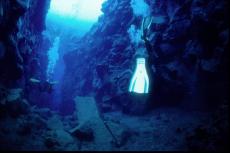Hurricanes have minimal impact on salt marshes
Costal ecosystems more at risk from moderate storms.
New research suggests that major hurricanes, though devastating to humans, have a minimal impact on salt marshes. The Boston University study reveals coastal ecosystems are more at risk of erosion by waves from moderate storms than from full-fledged tropical storms. In eight different marshes studied in the United States, Italy and Australia, extreme storm events accounted for less than one per cent of erosion.
"Salt marshes survive for thousands of years, which means they know how to cope against hurricane waves,” said study co-author Sergio Fagherazz. "Beaches or dunes on a beach just collapse all at once ... marshes don’t, which is a major advantage if you are serious about using them for hazard mitigation and coast protection." The knowledge of what ongoing moderate wave action does to salt marshes will be valuable to planners and conservationists. Salt marshes are diminishing worldwide, not just from regular erosion, but higher sea levels and changes in land use.
Vital habitats
Canada is also home to salt marshes, primarily in the Maritime provinces. Dr. Jeff Ollerhead, geography and environment professor and dean of science at Mount Allison University in New Brunswick, said Bay of Fundy marshes are relatively healthy, but many on the Atlantic and Northumberland Strait coasts are degrading. "In itself, rising sea levels aren't going to cause the marshes to disappear," said Ollerhead. "As long as the marshes have some place to migrate to, have some place to go, they'll be maintained, they'll be fine."
Aside from being valuable wildlife habitats, marshes are a vital for coastline protection, acting as living shorelines evolving with climate change and sea level rise, cheaper and easier to maintain than man-made barriers. Ollerhead says Atlantic Canada has been somewhat slow to take widespread action on salt marsh restoration, aside from a handful of controlled dike breaches, and says the region would benefit greatly if it would embrace the marshes' natural benefits.
"Otherwise, we're going to spend ever increasing amounts of money trying to keep the shoreline exactly where it is and exactly in the state that it is, and that's going to be increasingly expensive and increasingly futile," Ollerhead said.
- Log in to post comments























